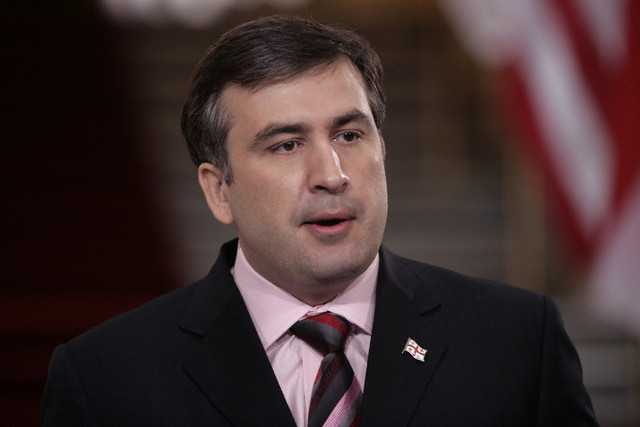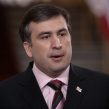
LATEST MOVES CHALLENGE SAAKASHVILI’S STANCE AND THE GEORGIAN-WESTERN PARTNERSHIP
Publication: Eurasia Daily Monitor Volume: 3 Issue: 193
By:

The chances of Georgia becoming a full-fledged member of the European Union and NATO have taken a hit from Tbilisi’s ongoing dispute with Moscow. As the West alternates between political and moral support for President Mikheil Saakashvili and cutting deals with Russia that are detrimental to Georgia’s interests, Saakashvili’s pro-Western government may come under fire at home.
The Georgian political establishment and pundits have differing interpretations of UN Security Council Resolution 1716, which was unanimously adopted on October 13. The resolution extended the mandate of the United Nations Observer Mission in Georgia (UNOMIG) until April 15, 2007, which automatically gave a green light to the continued presence of Russian peacekeepers in the conflict zone, and blamed Tbilisi for aggravating the situation in Abkhazia (www.un.org, EDM, October 17).
Analysts noted that the resolution used terms like “Georgian-Abkhaz conflict” that serve Russian interests in legitimizing the secession of Abkhazia from Georgia. While high-ranking officials in the United States and Europe subsequently voiced their support for Tbilisi, their gestures have not appeased all Georgian politicians and pundits. This group argued that the United States exchanged the resolution on Georgia for Russian support for the U.S.-drafted resolution on North Korea and anticipated Russian support against Iran.
Akhali Taoba newspaper ran a sarcastic editorial, “America – Georgia’s faithful Brutus” on October 14, in reference to the Bush administration’s attitude toward the UN resolution. The editorial said that Georgia under Saakashvili has repeated the mistakes made by former Georgian leaders who relied too much on Western partners, particularly the United States. “There is a high probability that Georgia might again find itself alone to the threat.” According to the editorial, when was president Eduard Shevardnadze attempted to attract the West with a trans-Eurasian oil pipeline, but Saakashvili went further and tried to win Western support by participating in the coalition against Saddam Hussein, accelerating NATO integration efforts, and taking anti-Russian steps. However, Washington and Western European governments, the editorial alleged, have not responded to these steps as Tbilisi had expected.
Statements by some NATO officials fuelled the concerns of Georgian politicians about the level of Western support. General Ray Henault, head of NATO Military Committee, insisted that Georgia is still far from NATO membership, despite entering the intensive dialogue phase (Newsinfo, October 17).
An extremely cautious tone regarding the Russian-Georgian controversy is detectable in the conclusions adopted by the EU External Relations Council at its October 17 meeting in Luxemburg. Along with “grave concerns” about Moscow’s anti-Georgian measures, the EU called on both sides to tone down the harsh rhetoric. However, Commissioner for External Relations Benita Ferrero-Waldner made clear that such calls mainly refer to Georgia (Civil Georgia, October 17). Meanwhile, some elements of the concluding statement appear more amenable toward Georgia, including the declared EU’s willingness to “facilitate mutual confidence building and contribute to a peaceful resolution of the crisis.”
The UN resolution threw Saakashvili’s team into a politically disadvantageous situation and left it highly vulnerable to criticism from the opposition, including Russia-leaning groups. The opposition has already mocked the naiveté of the Georgian Parliament’s July 18 resolution instructing the government to start necessary procedures to immediately suspend Russian peacekeeping operations in Abkhazia and South Ossetia and take measures to deploy international police forces in the conflict zone (TV-Imedi, October 17). Dealing with the political consequences of the UN resolution for Georgia, Resonansi interviewed several Georgian pundits for its October 16 issue. They assessed the UN resolution as a Russian diplomatic victory and result of Saakashvili’s “unqualified” policies.
According to analyst Paata Zakareishvili, the current resolution is more anti-Georgian than the earlier Resolution 1666. “The main point in this resolution is that the UN needs the presence of Russian peacekeepers in the conflict zones and underlined their importance while we [Georgia] want the peacekeepers’ to be withdrawn by the end of the year,” he said.
Ramaz Klimiashvili added, “The assumption that the United States has exchanged Georgia for North Korea is absolutely true….America and Russia can always strike a deal at the expense of Georgia. Our naive politicians still believe that America will support us [Georgia] against Russia. This will never happen.”
These viewpoints surprisingly echoed the attitudes of several Russian pundits, who argued that the United States has far more important concerns than protecting Georgia from Russia. Therefore any attempts to punish Moscow or moralize about its Georgia strategy are vain. The Russian media gloatingly noted that Washington’s “New Marshall Plan” for the post-Soviet states is not working because it underestimates the complexities of local realities (www.russiaprofile.org, www.ng.ru, October 4; Izvestiya.ru, October 16).
Georgian officials have tried to downplay the threat that the UN resolution might pose to Georgia and underline the recent supportive steps by the West. Nika Rurua, deputy chair of the parliamentary committee for defense and security, dismissed the resolution as “ineffective and senseless” (Kavkaz Press, October 17). However, some officials, including Irakli Alasania, Georgian Ambassador to the UN, and even Saakashvili, grudgingly admitted that the resolution is unacceptable. At a news conference on October 13, Saakashvili pointed out “several disputable aspects” in the resolution. “We have told our friends that these things must be improved in future resolutions and that everything must be written much more precisely,” he added.
While visiting Tbilisi today, October 19, U.S. Assistant Secretary of State for Europe and Eurasian Affairs Daniel Fried called the UN resolution a “victory for stability” and dismissed media allegations about a betrayal of Georgia by the United States as “absurd.” He also stated that the United States “will not recognize the independence of Abkhazia and South Ossetia and will not recognize the results of the referendums held there.” Fried, however, urged Tbilisi and Moscow to “find common language and a way out from this crisis” (Kavkaz Press, October 18).




